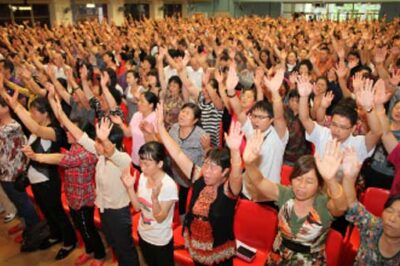American evangelist Randy Clark discovered that the Holy Spirit is fueling dramatic church growth in China in spite of persecution.
American healing evangelist Randy Clark, best known as the man who helped ignite the “Toronto Blessing” revival in Canada in 1994, met recently with seven top leaders of the New Wine House Church movement, a growing underground network that has an estimated 25 million members. New Wine is one of at least six major house-church movements that together comprise an estimated 98 million “unregistered” Christians in China.
Although Clark has preached in 23 nations and seen thousands converted, healed and delivered since the Toronto revival began, he went to China not to speak but to listen to those who are witnessing the most impressive church growth in the world.
Clark and his traveling companion, 51-year-old Rex Burgher, dressed in four layers of clothing including two overcoats, ski masks and hoods as they ventured into Beijing during the harsh winter. They looked like spies on a secret mission as they were quickly rushed from the airport to a van that would take them to a remote area of Inner Mongolia where the temperature was 38 degrees below zero.
“The guides didn’t want the police to know we were Americans,” Clark said. “So I bought a plain, ugly coat at Sam’s Club. We had ski masks with hoods over our hats, and scarves over our faces so they could barely see us.”
They drove for hours in the night. The extra clothing had not prepared them for ice that was a quarter-inch thick all around the inside of the car windows. The frozen floorboard numbed their feet. Clark put a towel between his shoulder and the window to shield his body from the bitter draft. “If that car died on the road, we probably would’ve frozen,” Clark told Charisma.
In the early morning hours, under the cover of darkness, the Americans were quietly rushed from the van, up a staircase and into an apartment where they would spend the remainder of the night. Clark and Burgher slept on beds made of padded boards, with no springs or mattresses. A simple light bulb was hanging from the ceiling over a bare concrete floor. One toilet ran constantly, and they filled a bucket with water and dumped it into the toilet to make it flush.
After sleeping for an hour and a half, Clark met with one of the seven house-church leaders of the New Wine movement, then with a group of about 60 house-church pastors. The leaders quietly trickled into the room at different times so they would not draw too much attention to the meeting.
In China, meetings like this are illegal. But they are occurring at all hours and on every day of the week in this communist stronghold.
“The Spirit of God fell, and we would sing,” says Clark of the early morning worship time. “It got a little loud at one point, and concern was on their faces because they didn’t want to draw too much attention. If they’d have been discovered they knew they would spend two to three years in a labor camp prison for being caught with an American.”
Passion for Evangelism
After spending time with these Christians, Clark and Burgher returned to the airport and flew to a province in southern China, where the temperature was 90 degrees warmer. Dressed in light jackets and blue jeans, the two men entered a modestly furnished hotel room where the New Wine House Church leaders used cell phones to secure guarded interviews and meetings. One or two leaders entered at a time, communicating with Clark through an interpreter while Burgher recorded the discussions.
What intrigued Clark the most was the fact that two of the top seven leaders from the New Wine House Church movement were women. The leaders said that women are sent out to evangelize in China more frequently than men are because villagers are sometimes suspicious of two strange men entering towns together. Although men and women of all ages evangelize in China, many pioneering young women–usually between ages 18 and 22–are changing the spiritual landscape of China.
Some of the female evangelists are even younger. Clark attended a house-church meeting where two teen-age girls testified about miracles God had done during their travels along China’s eastern coast. Clark listened to them testify of their simple itinerant preaching and found himself both fascinated and convicted by their selfless dedication.
Like other Christian girls their age, 18-year-old Mei and 16-year-old Lin leave their homes twice a year. They each carry two shoulder bags packed with Chinese Bibles, teaching materials and a few changes of clothes. The girls have less than $25 between them for food and travel for six months. When they begin their journey no one knows them, so they save their money for bus tickets home and eat few meals the next 10 days. They sleep under the stars or in the rain.
Going from town to town they share the gospel until someone is converted. “The Lord sent us here,” they tell the Christians in the village. “May we stay in your home?” New converts often agree to house them.
The girls ask Christians they meet along the way to invite friends and relatives to their homes. The first home usually becomes a station where the young evangelists can return months later and secure a place to stay–so they can disciple new converts in the new house church.
After a church is established and a Bible is given to its new leader, the young women begin a new missionary journey. Days pass, and often there are no families to stay with. Their bodies become thin for lack of food. At night they often sleep in the open fields, underneath trees, or they cover themselves with straw from animal shelters.
On their most recent trip, Mei and Lin’s feet were bruised and bleeding after 40 days of walking through the countryside. During this time they established 18 churches with about 40 people in each one. Many signs and miracles took place, they told Clark.
“The Lord just gives us the words and the faith to declare what Jesus can do,” Lin said.
During the last week of their latest trip, more than 10,000 people came to know Jesus as Savior in one coastal city. The girls used microphones and boldly conducted open-air meetings in a rural area outside the city.
On the last day of the meetings, the girls canceled the event and left because they felt uneasy. “Immediately after they left, the police went to their meeting place to arrest them, but the girls eluded their grasp,” Clark said.
In miraculous ways God guided these women from city to city in eastern China. When six months had passed, they purchased inexpensive bus tickets to return to their families before beginning another evangelism journey.
Martyrs and Marvels
Because the Chinese government forbids Christians to evangelize, most of these traveling Christians have been jailed more than once. They are routinely beaten and tortured by police or prison guards. So far, five leaders of the New Wine movement have been martyred.
One wave of persecution came in 1983. At that time 13 key leaders were imprisoned and told by communist guards to dig their own graves. All 13 gathered, prayed and cried together. “But after a while their crying turned into singing. They began to sing, ‘I don’t know about tomorrow, but I know who holds my hand.'” Clark said.
“The leaders decided that they would continue to preach as long as they lived. All 13 not only made it out of the prison alive, but today are working to send missionaries to all 56 minority groups in China as well as to other Asian countries.”
Clark asked one evangelist, Brother Zhu, to describe one of his four prison experiences.
“Sometimes they use a knife to cut our head, a rope to hit us or an electric stick to hit our head,” Zhu said. “We were always hungry and without food. So, when we are working outside in the field, we grab the grass and eat it. We work for the whole year and they only pay us one Chinese dollar. So each day we only have one penny. We use that dollar to buy paper for the toilet. It’s not regular toilet paper, just a piece of paper. We brush our teeth every three days because we don’t want to wear out the toothbrush.”
Another minister, Brother Li, compared his prison experience to seminary. “All the preachers went through the jail life and were beaten,” he said. “We endured persecutions and all kinds of severe punishment.
“During that time of jail and suffering life we don’t have Bibles. We only have a little piece of paper with Bible verses. Sometimes we wrote down our Bible verses on our clothes, our sleeve, and through this way we begin to preach the gospel in the jail.”
Often the families of those incarcerated suffer equally from hunger and humiliation. They are viewed as social outcasts because their imprisoned family members broke communism’s religious laws. But while China’s Christians are facing harsh opposition, they are winning new converts at the rate of 25,000 per day–conversions that are usually followed by miraculous signs, wonders and healings.
There also have been numerous reports of resurrections. In an eastern province, prison officials beat one Christian to death. “After they beat him to death, they didn’t want to send his body home because the government official was scared that when a Christian is sent home, the Christians will pray and the person will be resurrected,” one leader told Clark. “So they burned the body and just sent the ashes home.”
One unusual instance of raising the dead happened when three Christian women were preaching the gospel in a village. A man approached them and began to curse one of the girls. This sister turned back and said, “The Lord bless you.”
“Right after she said that, the man died!” a leader reported. “But the people who gathered around him encouraged the women to pray for the dead man. They laid hands on him and prayed and he was resurrected.”
Despite the increasing reports of miraculous signs and wonders, none of the Christian leaders from the New Wine movement accept any titles for themselves.
“I asked them if they saw that some people have an apostolic ministry,” Clark told Charisma. “One leader told me: ‘No, we don’t think like that. We’re all just brothers and sisters.’ Everyone knows who these seven are, but they don’t have titles like apostle so-and-so, but recognize people with that type of ministry.”
This humble attitude is prevalent among house-church leaders. One 50-year-old evangelist told Clark: “We, the so-called leaders, have only elementary schooling. Our education is not high. How could we do this work? I believe it is the work of the Holy Spirit.”
‘When the Holy Spirit Came’
Clark asked each of the leaders when the outpouring of the Holy Spirit began to happen in their group and what it was like. He was surprised when every leader answered his question with the same words–“When the Holy Spirit came in 1988…”
It was in 1988 that a missionary from Hong Kong, Dennis Balcombe, visited mainland China more than 10 times. He ignited revival fires all over the continent.
Brother Zhu, one of the leaders, told Clark that underground churches were “like dead bones” before 1988. “Before, we were preaching the same message, but when people here heard it, they didn’t feel much impact. But after 1988, our preaching is anointed and leaves great impact,” he said.
Because of Clark’s own revival experience in Toronto in 1994, he pressed Zhu and the others for more information, asking them to describe the manifestations they experienced in 1988. “All the experiences were just like what we read about in the second chapter of Acts,” Zhu replied. “Some were laughing, some crying, some rolling on the floor, some were speaking in tongues, and people are thinking they are not normal–like they are drunk.”
Added Brother Li: “Before 1988, the church was always crying. So many Gentiles were scared because they thought that to become a Christian meant you had to cry. But after we experienced the laughing movement, then the Gentiles saw, ‘Hey, the church is a different place. We can rejoice in the church!’ Then the Christians began to multiply. So many people received Jesus.”
Clark was intrigued by the fact that the “holy laughter” phenomenon had touched the Chinese church. He notes that revival historian Richard M. Riss has documented that unusual manifestations have characterized many past revivals. He documents that as early as 1233, believers in northern Italy spoke of “jubilation and spiritual inebriation” during visitations of the Holy Spirit.
What caught Clark’s attention most was that China’s laughing revival occurred before the Toronto and Pensacola outpourings and that the 1988 revival actually produced a high percentage of growth in the church. One leader told Clark that healings have gone up 80 percent since 1988. More than 60 million people have received Jesus nationwide since the outpouring.
“At that time, all new Christians were like a burning fire,” Brother Li said. “No matter where we go, people just come and touch the fire and then become Christians.”
Delighted that he received all he could have hoped for from his interviews, Clark packed up his video equipment and gave the pastors $7,000 to help buy Bibles and support the families of those imprisoned for their faith. Clark then asked Brother Li what Christians in the West could do to help them.
Brother Li said he remembers when he and 30 co-workers received their first Bible from a foreign country. Everyone took a turn to kiss the Bible.
“In the Western world you have a church building, you have fancy Bibles, you have seminary schools,” Brother Li said. “Therefore we request from the Western nations that all the Christians who have faith would pray for China.”
Chinese believers hold a strategic key to reaching the world-and they need our support.
Since the aftermath of the September 11th terrorist attacks, Christians in the West have recognized the strategic importance of reaching Muslims. In a moment’s time, our eyes have been opened to what missiologists have been telling us all along. Islam is the last great spiritual stronghold to be overcome by the love of Christ.
While the church in the West grapples with the challenge of Islam, God has been mobilizing an army to reach the Muslim world. In China, the world’s most populous nation, thousands of missionaries are preparing themselves to bring the gospel of Jesus Christ back to Jerusalem via the Islamic countries in the Middle East.
Christians in China’s underground church–which currently numbers 40 million-50 million believers–believe this is their hour. They know they have a historic responsibility to complete the gospel’s global circuit, which began in Israel nearly 2,000 years ago.
While the heroic faith and miracle stories of Chinese Christians have been well-publicized in the last few years, less noted has been their own interpretation of these events. They believe their suffering, imprisonment and torture has been part of God’s preparation for them to reach the difficult world of Islam. They can endure harsh conditions in Muslim nations because they have been tested by the fire of persecution in their own country.
They can survive the stark darkness of Islam because they have lived under communism. They can do much with little because they have lived in poverty for years in the foothills of China. They know how to be steadfast in the face of persecution and danger because they have subsisted on such a diet from the early days of China’s revival.
The training has equipped them. Now they feel called to reach the world.
In the last few years I’ve had the privilege of being with many of China’s top underground church leaders. I’ve listened to their burden. They aren’t waiting for missionaries to come into China when the Bamboo Curtain falls. They are waiting for the curtain to fall so they can be launched out!
I recently brought two Messianic Jewish ministers with me into China to help acquaint China’s underground movements on how to reach the Jewish people. It was a phenomenal moment. The underground churches are poised to march through Central Asia to reach Muslims and Jews, but they also are ready to reach all nations.
Geopolitical experts predict that China will become a pre-eminent economic superpower in the coming years. But what they don’t realize is that China’s greatest contribution may not be in the global marketplace but in the sending of missionaries.
Keep your eyes on China. Believers there will play a pivotal role in fulfilling the Great Commission. While they have missed out on centuries of missionary activity, they are now doing their best to catch up and lead. I hope American Christians will do their part in supporting this emerging global force.
Rich Kao pastors City Hill Fellowship in Minneapolis. He also serves as a board member of Strategic China Initiative, a nonprofit missions organization dedicated to training the leaders of China’s underground church movement.
C. Hope Flinchbaugh is a free-lance writer based in Pennsylvania. Her new novel, Daughter of China, will release in the fall from Bethany House.
*Names in this report were changed to protect the identities of Chinese Christians who face the threat of imprisonment







Leave a Comment
You must be logged in to post a comment.